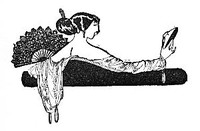The Hohenzollerns in America<br />With the Bolsheviks in Berlin and Other Impossibilities, Stephen Leacock [crime books to read txt] 📗

- Author: Stephen Leacock
Book online «The Hohenzollerns in America<br />With the Bolsheviks in Berlin and Other Impossibilities, Stephen Leacock [crime books to read txt] 📗». Author Stephen Leacock
Cousin Willie had sneaked away with his box down to the lower deck. I thought it mean of him not to stay with his father. I never noticed till now what a sneaking face Cousin Willie has. In his uniform, as Crown Prince, it was different. But in his shabby clothes, among these rough people, he seems so changed. He walks with a mean stoop, and his eyes look about in such a furtive way, never still. I saw one of the ship's officers watching him, very closely and sternly.
Cousin Karl of Austria, and Cousin Ruprecht of Bavaria, are not here. We thought they were to come on this ship, but they are not here. We could hardly believe that the ship would sail without them.
I managed to get Uncle William out of the crowd and down below. He was glad to get off the deck. He seemed afraid to look at the sea, and when we got into the big cabin, he clutched at the cover of the port and said, "Shut it, help me shut it, shut out the sound of the sea;" and then for a little time he sat on one of the bunks all hunched up, and muttering, "Don't let me hear the sea, don't let me hear it." His eyes looked so queer and fixed, that I thought he must be in a sort of fit, or seizure. But Uncle Henry and Cousin Willie and Cousin Ferdinand came into the cabin and he got better again.
Cousin Ferdinand has got hold of a queer long overcoat with the sleeves turned up, and a little round hat, and looks exactly like a Jew. He says he traded one of our empty boxes for the coat and hat. I never noticed before how queer and thick Cousin Ferdinand's speech is, and how much he gesticulates with his hands when he talks. I am sure that when I visited at Sofia nobody ever noticed it. And he called Uncle William and Uncle Henry "Mister," and said that on the deck he had met two "fine gentlemen," (that's what he called them), who are in the clothing trade in New York. It was with them he traded for the coat.
Cousin Ferdinand, who is very clever at figures, is going to look after all our money, because the American money is too difficult for Uncle William and Cousin Willie to understand. We have only a little money, but Cousin Ferdinand said that we would put it all together and make it a pool. But when Uncle Henry laughed, and turned his pockets out and had no money at all, Cousin Ferdinand said that it would NOT be a pool. He said he would make it "on shares" and explained it, but I couldn't understand what it meant.
While he was talking I saw Cousin Willie slip one of the pieces of money out of the pile into his pocket: at least I think I saw it; but he did it so quickly that I was not sure, and didn't like to say anything.
Then a bell rang and we went to eat in a big saloon, all crowded with common people, and very stuffy. The food was wretched, and I could not eat. I suppose Uncle was famished from the long waiting and the bad food in the emigrant shed. It was dreadful to see the hungry way that he ate the greasy stew they gave us, with his head down almost in his plate and his moustache all unkempt. "This ragout is admirable," he said. "Let the chef be informed that I said it."
Cousin Ferdinand didn't sit with us. He sat beside his two new friends and they had their heads all close together and talked with great excitement. I never knew before that Cousin Ferdinand talked Yiddish. I remember him at Sofia, on horseback addressing his army, and I don't think he talked to his troops in Yiddish. He was telling them, I remember, how sorry he was that he couldn't accompany them to the front. But for "business in Sofia," he said, he would like to be in the very front trenches, the foremost of all. It was thought very brave of him.
When we got up from supper, the ship was heaving and rolling quite a bit. A young man, a steward, told us that we were now out of the harbor and in the open sea. Uncle William told him to convey his compliments to the captain on his proper navigation of the channel. The young man looked very closely at Uncle and said, "Sure, I'll tell him right away," but he said it kindly. Then he said to me, when Uncle couldn't hear, "Your pa ain't quite right, is he, Miss Hohen?" I didn't know what he meant, but, of course, I said that Uncle William was only my uncle. Hohen is, I should explain, the name by which we are known now. The young man said that he wasn't really a steward, only just for the trip. He said that, because I had a strange feeling that I had met him before, and asked him if I hadn't seen him at one of the courts. But he said he had never been "up before one" in his life. He said he lives in New York, and drives an ice-wagon and is an ice-man. He said he was glad to have the pleasure of our acquaintance. He is, I think, the first ice-man I have ever met. He reminds me very much of the Romanoffs, the Grand Dukes of the younger branch, I mean. But he says he is not connected with them, so far as he knows. He said his name is Peters. We have no Almanach de Gotha here on board the steamer, so I cannot look up his name.
S.S. America. Thursday
We had a dreadful experience last night. In the middle of the night Uncle Henry came and called me and said that Uncle William was ill. So I put on an old shawl and went with him. The ship was pitching and heaving with a dreadful straining and creaking noise. A dim light burned in the cabin, and outside there was a great roaring of the wind and the wild sound of the sea surging against the ship.
Uncle William was half sitting up in his rough bunk, with the tattered gray blankets over him, one hand was clutched on the side of the bed and there was a great horror in his eyes. "The sea; the sea," he kept saying, "don't let me hear it. It's THEIR voices. Listen! They're beating at the sides of the ship. Keep them from me, keep them out!"
He was quiet for a minute, until there came another great rush of the sea against the sides of the ship, and a roar of water against the port. Then he broke out, almost screaming—"Henry, brother Henry, keep them back! Don't let them drag me down. I never willed it. I never wanted it. Their death is not at my door. It was necessity. Henry! Brother Henry! Tell them not to drag me below the sea!"
Like that he raved for perhaps an hour and we tried to quiet him. Cousin Willie had slipped away, I don't know where. Cousin Ferdinand was in his bunk with his back turned.
"Do I slip to-night, at all," he kept growling "or do I not? Say, mister, do I get any slip at all?"
But no one minded him.
Then daylight came and Uncle fell asleep. His face looked drawn and gray and the cords stood out on his withered hand, which was clutched against his shirt.
So





Comments (0)